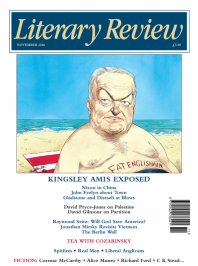Frank McLynn
Randy Old Goat
The Life of Kingsley Amis
By Zachary Leader
Jonathan Cape 900pp £25
Kingsley Amis was a prominent figure in English letters from the mid 1950s on, but whether this was because his clubbable personality automatically attracted publicity or because there was enduring worth in his books is more difficult to answer; hence my use of ‘prominent’ rather than ‘significant’. Zachary Leader is in no doubt that Amis was a major literary figure and makes extraordinary and, I submit, exaggerated claims for his importance. Let me attempt a judicious summing-up. Amis was a good minor poet in the Robert Graves tradition (Graves was one of his heroes), a writer who insisted on precise craftsmanship and lucid meanings in verse; he had no time for the elaborate symbolic apparatuses of W B Yeats, T S Eliot, Wallace Stevens et al – authors whose work often does require a concordance before one can understand it. He was a good minor comic novelist, not in the class of Evelyn Waugh or P G Wodehouse or even, for my money, Peter de Vries; but there is no denying that Amis could often be extremely funny. He was an essayist of high talent, though again not quite in the premier division with the likes of Gore Vidal. And by all accounts he was a brilliant mimic, a superb raconteur and a sparkling conversationalist. Not a bad man, then, to have as a dinner-table companion. But is he important enough to warrant a 900-page biography? Certainly not.
Although one can respond positively to many strands in the Amis world-view (the contempt for the nonsense taught and purveyed at universities, the distaste for the serpentine duplicity and depraved malice of literary London, the hatred of the moronic bien-pensant merchants of political correctness), it has to be conceded that

Sign Up to our newsletter
Receive free articles, highlights from the archive, news, details of prizes, and much more.@Lit_Review
Follow Literary Review on Twitter
Twitter Feed
Princess Diana was adored and scorned, idolised, canonised and chastised.
Why, asks @NshShulman, was everyone mad about Diana?
Find out in the May issue of Literary Review, out now.
Literary Review - For People Who Devour Books
In the Current Issue: Nicola Shulman on Princess Diana * Sophie Oliver on Gertrude Stein * Costica Bradatan on P...
literaryreview.co.uk
Under its longest-serving editor, Graydon Carter, Vanity Fair was that rare thing – a New York society magazine that published serious journalism.
@PeterPeteryork looks at what Carter got right.
Peter York - Deluxe Editions
Peter York: Deluxe Editions - When the Going Was Good: An Editor’s Adventures During the Last Golden Age of Magazines by Graydon Carter
literaryreview.co.uk
Henry James returned to America in 1904 with three objectives: to see his brother William, to deliver a series of lectures on Balzac, and to gather material for a pair of books about modern America.
Peter Rose follows James out west.
Peter Rose - The Restless Analyst
Peter Rose: The Restless Analyst - Henry James Comes Home: Rediscovering America in the Gilded Age by Peter Brooks...
literaryreview.co.uk